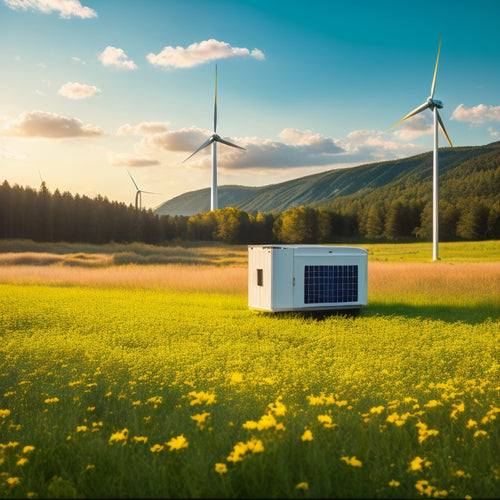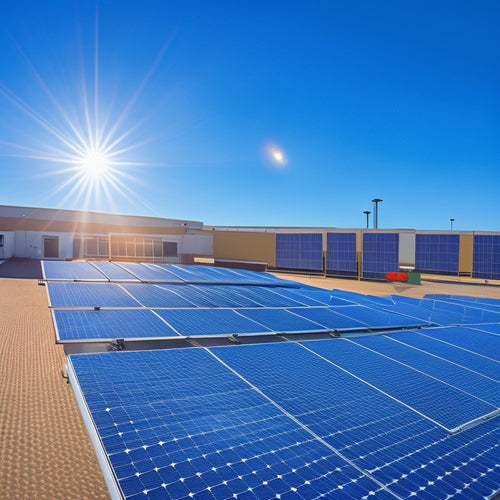
3 Best Inverter Buying Essentials Checklist
Share
When buying an inverter, you'll want to focus on three essential areas to guarantee you get the right one for your needs. First, consider the inverter type and compatibility, including the advantages and limitations of pure sine wave, modified sine wave, or square wave inverters, and assess installation requirements. Next, verify the power rating and efficiency, as a higher rating than necessary can lead to wasted energy and increased costs. Finally, look for vital safety features and certifications, such as built-in surge protection, thermal management, and certifications like UL or ETL. By focusing on these areas, you'll be well on your way to selecting the perfect inverter for your system.
Overview
- Choose the right inverter type (pure sine wave, modified sine wave, or square wave) based on your power needs and budget constraints.
- Ensure the inverter's power rating aligns with your system requirements, considering battery capacity and load management.
- Opt for high-efficiency inverters (above 90%) to minimize energy losses and maximize savings, with a focus on peak efficiency above 98%.
- Look for safety features like built-in surge protection, thermal management, and certifications like UL or ETL to ensure compliance with safety standards.
- Check compatibility with your battery type and charging system to guarantee optimal performance and energy harvesting.
Inverter Type and Compatibility
Since you're considering purchasing an inverter, it's vital to determine the correct type and verify compatibility with your specific requirements.
You'll need to choose between a pure sine wave, modified sine wave, or square wave inverter, each with its advantages and limitations. Research inverter brands to find one that meets your power needs and budget.
Consider the installation requirements, including the type of electrical panel, wiring, and grounding system you have. Confirm the inverter is compatible with your battery type and charging system.
Additionally, understanding key specifications such as power rating, input voltage, and efficiency rating is essential for selecting the right inverter.
Don't overlook the importance of surge protection, overvoltage protection, and short-circuit protection to prevent damage to your equipment.
Power Rating and Efficiency
Two essential factors to evaluate when selecting an inverter are its power rating and efficiency, as these directly impact the device's performance and your overall energy savings.
You'll want to verify the inverter's power rating matches your system's requirements, taking into account factors like battery capacity and load management. A higher power rating than needed can result in wasted energy and increased costs, while an underpowered inverter can lead to poor performance and reduced lifespan.
Efficiency, measured in percentage, indicates how much of the input energy is converted to usable output. To achieve peak energy harvesting, it's vital to examine inverter efficiency ratings, such as CEC, and focus on high peak efficiency ratings, typically above 98%.
Look for an inverter with high efficiency (above 90%) to minimize energy losses and maximize your savings.
Safety Features and Certifications
When evaluating an inverter's safety features and certifications, you must consider the risks associated with electrical shock, fire, and equipment damage.
Look for inverters with built-in surge protection to safeguard against power surges and spikes. A good inverter should also have a reliable thermal management system to prevent overheating, which can lead to equipment failure or even fires.
High-efficiency inverters with advanced features like Maximum Power Point Tracking (MPPT) efficiency optimize energy harvesting, guaranteeing maximum energy output while minimizing the risk of overheating.
Check for certifications like UL (Underwriters Laboratories) or ETL (Intertek), which verify the inverter meets strict safety standards.
Additionally, consider inverters with features like short-circuit protection, overvoltage protection, and grounding fault protection to guarantee your safety and the integrity of your equipment.
Frequently Asked Questions
Can I Install an Inverter Myself or Do I Need a Professional?
You're considering a DIY installation, but ask yourself: do you have the electrical knowledge to secure a safe, efficient setup? If not, it's recommended to opt for professional installation to avoid risks and guarantee peak performance.
How Do I Dispose of My Old Inverter Safely and Responsibly?
Don't worry, you're not stuck with an old inverter; you can responsibly dispose of it! You'll need to check local disposal regulations, but many manufacturers offer recycling options - just search for theirs, or check with local waste management for guidance.
Are Inverters Suitable for Use in High-Temperature Environments?
When operating in high-temperature environments, you'll want to guarantee your inverter's heat resistance is excellent, as excessive heat can decrease inverter efficiency, leading to reduced performance and lifespan; look for models with high temperature ratings and advanced cooling systems.
Can I Use an Inverter With a Generator or Solar Panel Simultaneously?
You'll need to ascertain inverter compatibility when connecting it to a generator or solar panel simultaneously, as inverter settings must synchronize with generator power output to avoid conflicts and secure seamless energy supply.
What Is the Average Lifespan of an Inverter and Its Components?
As you commence on your off-grid journey, you'll want to know that the average lifespan of an inverter is around 10-15 years, but with proper inverter maintenance tips, you can extend the durability of its components, ensuring your freedom from grid dependence.
Ready to Buy
You've got your checklist in hand, and now it's time to go inverter shopping like a pro! Remember, choosing the right inverter is like steering through a treacherous obstacle course - one misstep can lead to a whole lot of trouble. Don't get left in the Dark Ages, stuck with an inverter that's as useful as a candle in a blackout. By prioritizing inverter type and compatibility, power rating and efficiency, and safety features and certifications, you'll be illuminating your path to a brighter, more reliable energy future.
Related Posts
-

Is This the Future of Alternative Energy Systems
Yes, alternative energy systems are shaping the future of energy. Innovations in solar and wind technologies are driv...
-

Sustainable and Eco-Friendly Generators for a Reduced Carbon Footprint
Sustainable and eco-friendly generators are perfect for cutting your carbon footprint and increasing energy efficienc...
-

Essential Solar Panel Mounts for Commercial Properties
When it comes to essential solar panel mounts for your commercial property, durability and wind resistance are key fa...


